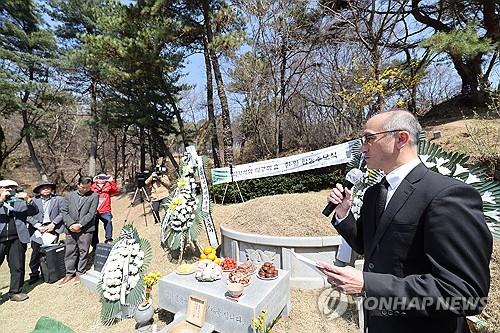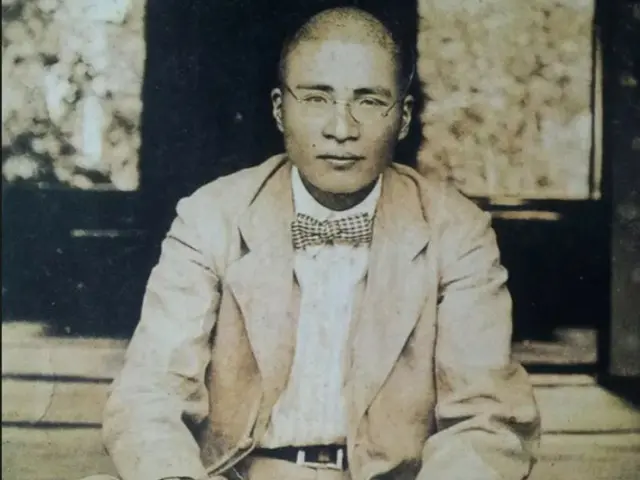Ref.>"米国教授「韓国に蛮行を犯した日本人。韓国が許しても私は許さない」"
>"【韓国】 恐怖のスクールバス… 40人乗せて底が抜けたまま高速道路を走行"
>"韓国紙「韓国と日本は良き隣人となり共に勝者になる旅に出よう。時間はあまりない」"
>"池上彰氏「日本はそろそろ『アメリカ追従』から卒業せよ 日本がもっと仲良くすべき国は韓国。隣国と仲良くすることは外交の基本』"
-----------------------------------------
> 映画『道~白磁の人~』予告編
Translation; "I hope that my body and soul will be remained in Korea.".. a Japanese who defended nature and culture of Korea = news report in S. Korea
>"「私の体と心は朝鮮に残してほしい」…朝鮮の自然・文化を守った日本人=韓国報道"
> 日本による植民地時代に、朝鮮の文化保存と山林の保護に尽力した日本人「浅川巧(たくみ)」(1891~1931年)の 93周忌を迎え、日韓両国の人々が追悼した。
> 韓国の市民団体である「浅川伯教(のりたか)・巧」顕彰会は2日、ソウルのマンウリ(忘憂里)公園にある浅川巧墓地で「浅川巧 93周忌追悼式」を開いた。
On the 93rd anniversary of the death of Takumi Asakawa (1891-1931), a Japanese male who worked hard to preserve Korea's culture and protect its forests during the Japanese colonial period, persons from both Japan and S. Korea paid tribute.
On April 2, the Takumi Noritaka Asakawa Memorial Society (correct name in English is unknown), a Korean civic organization, held a memorial service to commemorate the 93rd anniversary of Takumi Asakawa's death at the Takumi Asakawa's graveyard in the Manguri Park, Seoul.
> この日の行事には、キム・ジョンギュ(金宗圭)文化遺産国民信託理事長やシン・ボンギル(申鳳吉)韓国外交協会長、チョン・ジェスク(鄭在淑)元文化財庁長、在韓日本大使館の川瀬和広公報文化院長(公使)など20余人が参席した。
> 彼らは追悼曲を歌い、兄の伯教が弟の巧のために残した追悼の辞を朗読した。
> 1931年4月2日にこの世を去った浅川巧は、代表的な新韓派の人物である。
At the event on that day, more than 20 persons participated in it, chairman of the national trust for cultural heritage Kim Jong-kyu, chairman of the S. Korean diplomacy association Sin Bon-ggil, former administrator of Cultural Heritage Administration Chung Jae-suk, chief of cultural PR office (minister) of the Japanese embassy in S. Korea Kazuhiro Kawase, etc.
They sang a memorial song and read the eulogy that his older brother, Noritaka, left for his younger brother, Takumi.
Takumi Asakawa, who passed away on April 2, 1931, was a typical pro-Korea person.
> 浅川巧は当時、兄とともに朝鮮で生活し、陶磁器をはじめとした民芸品の研究と保存に尽力した。
> 朝鮮総督府の林業研究所で働きながら、五葉松(朝鮮松)の露天埋蔵発芽促進法を開発するなど、山林保護に身を捧げた。
> 浅川巧の墓前には「韓国の山と民芸を愛し、韓国人の心の中に生きた日本人ここに韓国の土となる」という文言が刻まれた墓碑が建っている。
Around the time, Takumi Asakawa lived in Korea with his brother and devoted himself to researching and preserving folk crafts such as ceramics.
While working at the forestry research institute of the Korean Government-General's Office, he devoted himself to preserve mountain forests, including developing a method to promote the germination of Goyomatsu (Korean pine) in open space.
In front of Takumi Asakawa's grave, a tombstone has been erected with inscription words saying "the person who loved Korean mountains and folk art, and who lived in the hearts of Koreans, becomes the soil of Korea."
> 浅川巧の生涯は、映画「道~白磁の人」(2012年)でも知られている。
> 顕彰会のイ・ドンシク会長は「われわれが浅川巧を尊敬し慕い追悼するのは、われわれが困難な時に来て多くの愛情を注ぎ代弁してくれたからだ」とし「互いに心の通じ合う韓日の国民たちが来て、一人の人物を一緒に追悼する心が和合することは、巧と伯教が願い望んでいた理想郷ではないかと思う」と語った。
Takumi Asakawa's life is also known by the movie "TAKUMI: The Man Beyond Borders" (2012).
Lee Dong-shik (correct spelling is unknown), chairperson of the Memorial Society said that "The reason why we respect, adore and mourn Takumi Asakawa is because he came here when we were in difficulty and poured out much love and spoke for us" and "I think this is the utopia that Takumi and Noritaka hoped for, where the persons of (S)Korea and Japan, who have a mutual understanding each outher, come together and jointly mourn the loss of one person."


